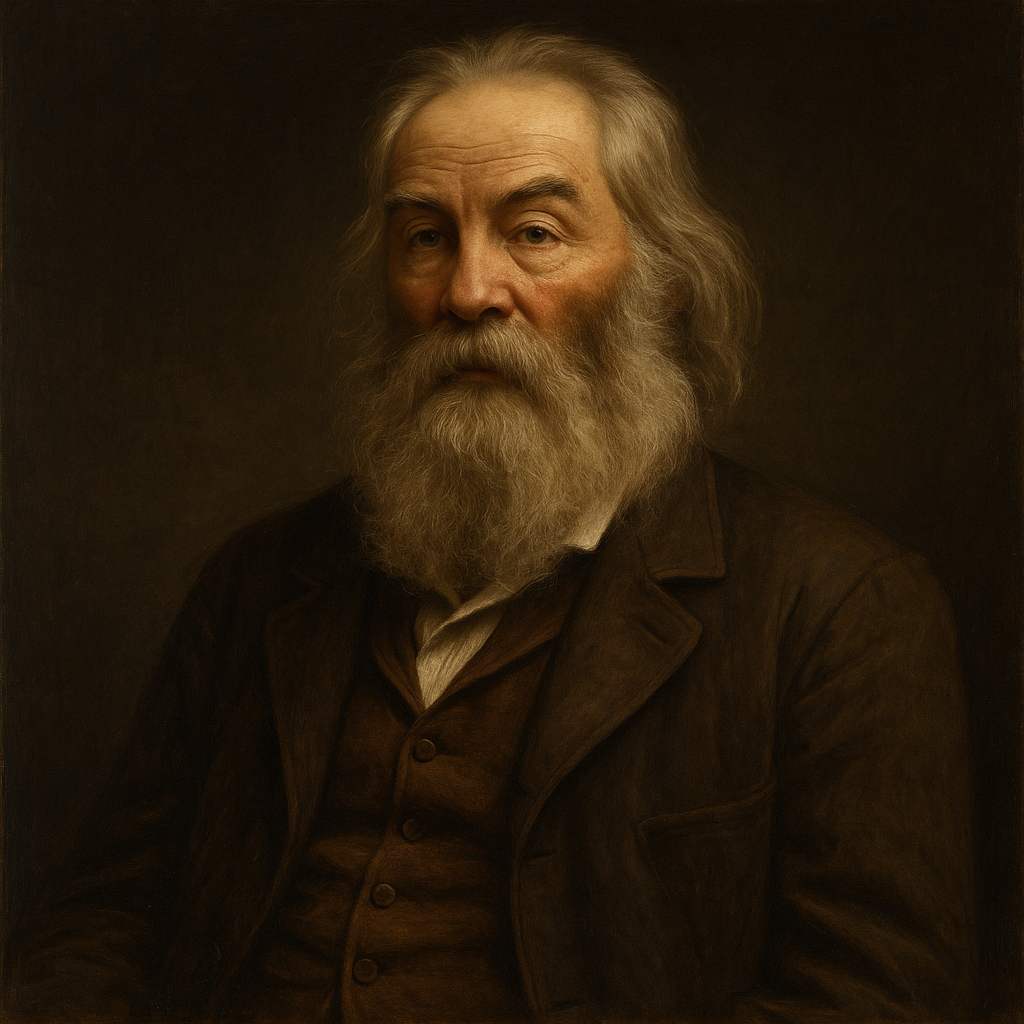5 Poems by Walt Whitman
1819 - 1892
Walt Whitman Biography
Walt Whitman, born on May 31, 1819, in West Hills, Long Island, New York, is widely considered one of the most influential poets in American literature. His work marked a departure from traditional poetic forms and themes, and he is often referred to as the "father of free verse."
Whitman grew up in Brooklyn, New York, in a working-class family. He left formal schooling at age 11 to help support his family, working various jobs including printer's apprentice, teacher, and journalist. These diverse experiences greatly influenced his writing, giving him a broad perspective on American life.
In 1855, Whitman self-published the first edition of "Leaves of Grass," a collection of poetry that would become his life's work. This first edition contained just 12 untitled poems, including what would later be titled "Song of Myself." The book was revolutionary in both its content and style. Whitman's free verse, with its long lines and rhythmic qualities reminiscent of biblical psalms, broke from traditional poetic forms. His subject matter—celebrating the human body, democracy, nature, and the self—was equally unconventional and sometimes considered controversial.
Throughout his life, Whitman continued to revise and expand "Leaves of Grass," publishing several editions. The final "deathbed" edition, published in 1892, contained almost 400 poems.
Whitman's poetry is characterized by its exuberance, its celebration of the individual and the collective, and its embrace of the physical and spiritual aspects of human existence. He often employed catalogs or lists in his poems, enumerating the diversity of American life and landscapes. His work is infused with themes of democracy, equality, and the interconnectedness of all things.
During the American Civil War, Whitman worked as a nurse in army hospitals, an experience that profoundly affected him and his writing. His poem "When Lilacs Last in the Dooryard Bloom'd" is a famous elegy for Abraham Lincoln.
Whitman's influence on American poetry and culture has been immense. His unconventional style and subject matter paved the way for future generations of poets to experiment with form and content. His celebration of the American experience and his inclusive vision of democracy have become integral to the American literary canon.
In addition to his poetry, Whitman is known for his prose works, including "Democratic Vistas" and "Specimen Days." He was also one of the first American writers to openly address same-sex love in his work, particularly in his "Calamus" poems, making him an important figure in LGBTQ+ literary history.
Whitman's life and work embodied many of the contradictions and complexities of 19th-century America. He celebrated both the individual and the collective, the body and the soul, the urban and the rural. His poetry sought to encompass the vast diversity of American life and landscape.
Despite initial controversy and mixed critical reception, Whitman's reputation grew steadily during his lifetime and after his death. He died on March 26, 1892, in Camden, New Jersey, leaving behind a body of work that continues to be widely read, studied, and influential.
Today, Walt Whitman is recognized as one of the most important American poets, a pioneer whose work helped to define a distinctly American poetic voice. His expansive, inclusive vision of humanity and his innovative poetic techniques have inspired countless writers and continue to resonate with readers around the world. Whitman's assertion "I contain multitudes" from "Song of Myself" has become emblematic of both his poetic style and his view of the complex, contradictory nature of the self and of America itself.
This text was generated by AI and is for reference only. Learn more
Username Information
No username is open
Unique usernames are free to use, but donations are always appreciated.
Quick Links
© 2024-2025 R.I.Chalmers (V2Melody).

All music on this site by R.I.Chalmers (V2Melody) is licensed under a Creative Commons Attribution-NonCommercial 4.0 International License.
Attribution Requirement:
When using this music, you must give appropriate credit by including the following statement (or equivalent) wherever the music is used or credited:
"Music by R.I.Chalmers (V2Melody) – https://v2melody.com"
Support My Work:
If you enjoy this music and would like to support future creations, donations are always welcome but never required.
Donate






